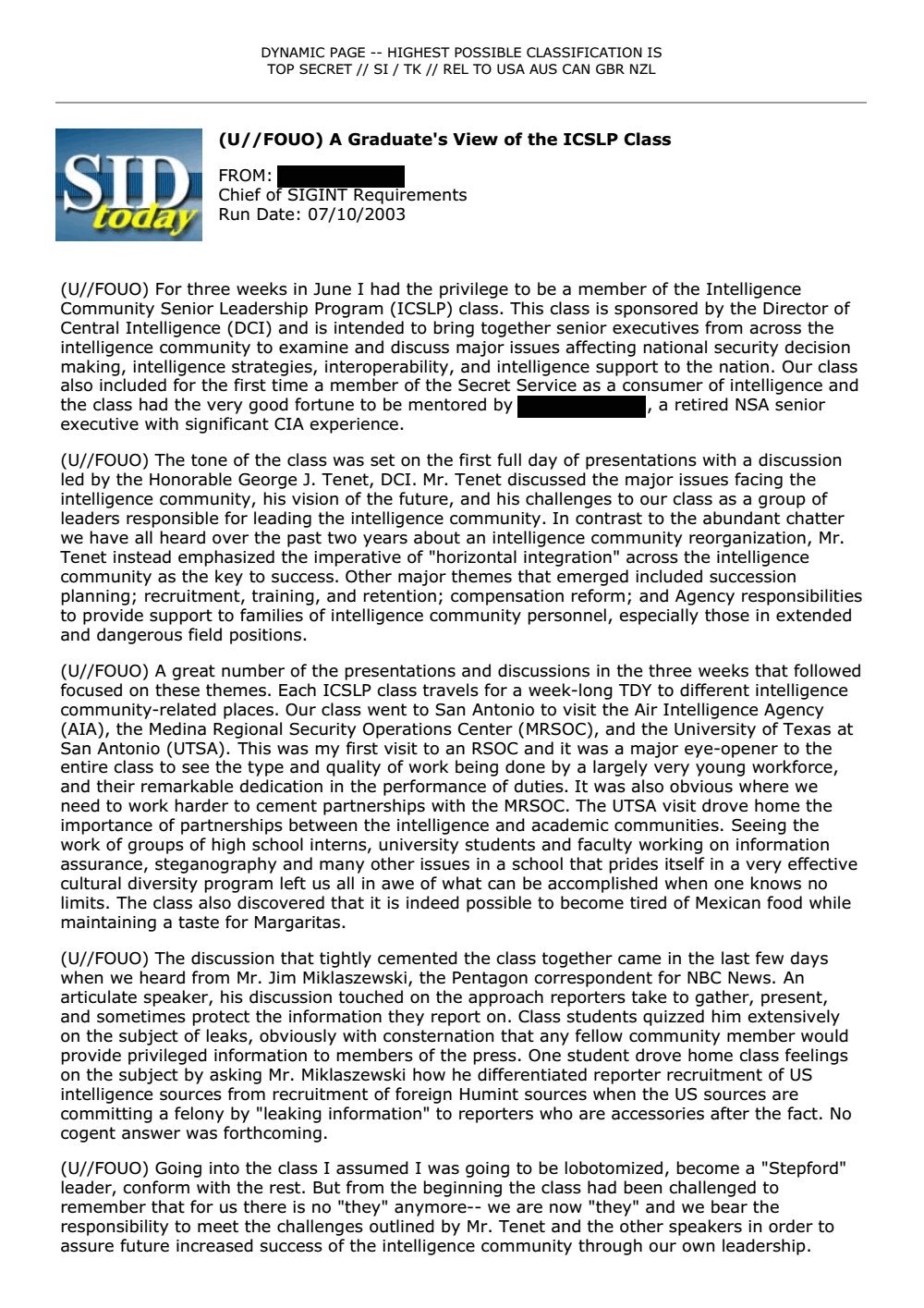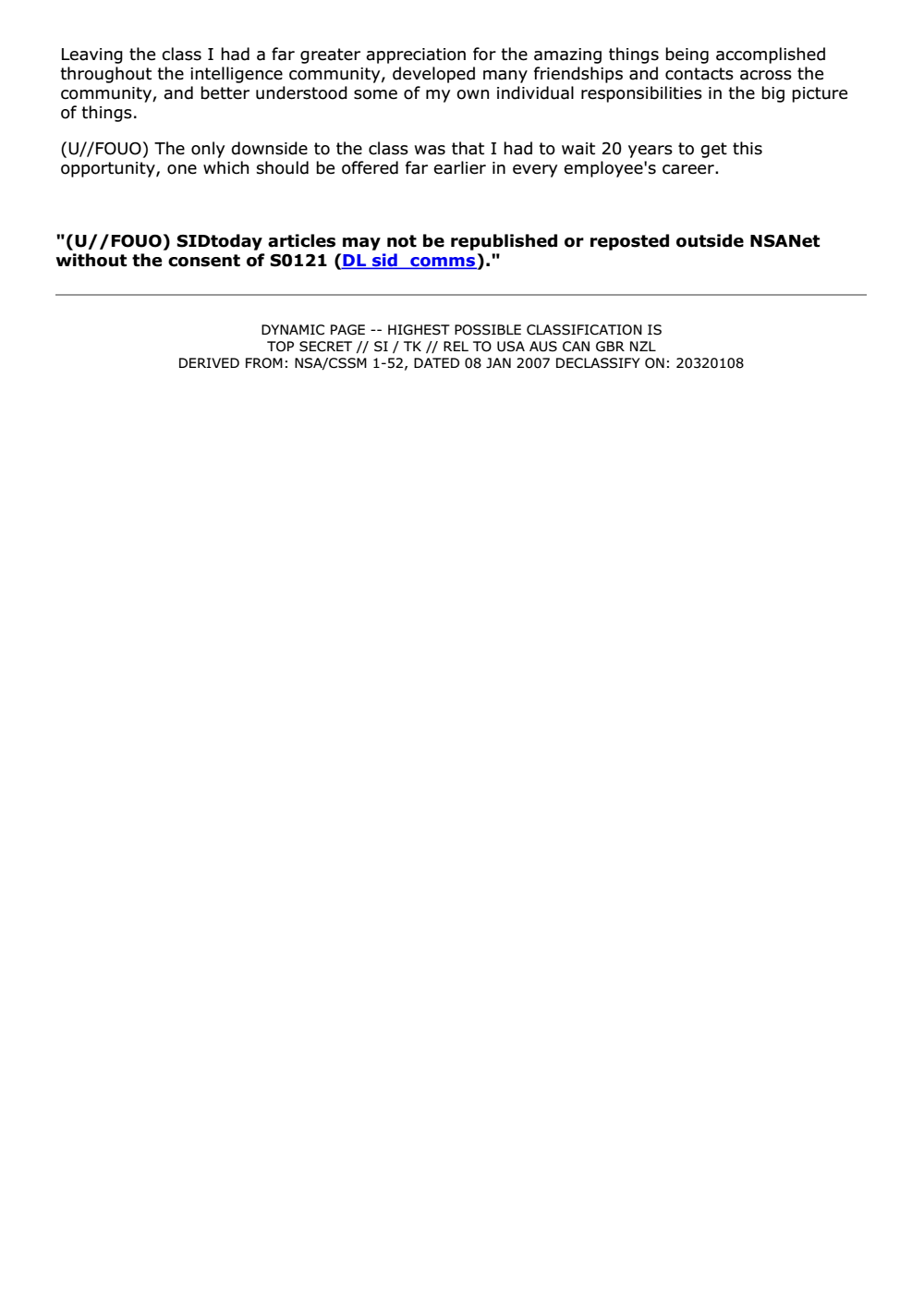
DYNAMIC PAGE -- HIGHEST POSSIBLE CLASSIFICATION IS
TOP SECRET // SI / TK // REL TO USA AUS CAN GBR NZL
(U//FOUO) A Graduate's View of the ICSLP Class
FROM:
Chief of SIGINT Requirements
Run Date: 07/10/2003
(U//FOUO) For three weeks in June I had the privilege to be a member of the Intelligence
Community Senior Leadership Program (ICSLP) class. This class is sponsored by the Director of
Central Intelligence (DCI) and is intended to bring together senior executives from across the
intelligence community to examine and discuss major issues affecting national security decision
making, intelligence strategies, interoperability, and intelligence support to the nation. Our class
also included for the first time a member of the Secret Service as a consumer of intelligence and
the class had the very good fortune to be mentored by
, a retired NSA senior
executive with significant CIA experience.
(U//FOUO) The tone of the class was set on the first full day of presentations with a discussion
led by the Honorable George J. Tenet, DCI. Mr. Tenet discussed the major issues facing the
intelligence community, his vision of the future, and his challenges to our class as a group of
leaders responsible for leading the intelligence community. In contrast to the abundant chatter
we have all heard over the past two years about an intelligence community reorganization, Mr.
Tenet instead emphasized the imperative of "horizontal integration" across the intelligence
community as the key to success. Other major themes that emerged included succession
planning; recruitment, training, and retention; compensation reform; and Agency responsibilities
to provide support to families of intelligence community personnel, especially those in extended
and dangerous field positions.
(U//FOUO) A great number of the presentations and discussions in the three weeks that followed
focused on these themes. Each ICSLP class travels for a week-long TDY to different intelligence
community-related places. Our class went to San Antonio to visit the Air Intelligence Agency
(AIA), the Medina Regional Security Operations Center (MRSOC), and the University of Texas at
San Antonio (UTSA). This was my first visit to an RSOC and it was a major eye-opener to the
entire class to see the type and quality of work being done by a largely very young workforce,
and their remarkable dedication in the performance of duties. It was also obvious where we
need to work harder to cement partnerships with the MRSOC. The UTSA visit drove home the
importance of partnerships between the intelligence and academic communities. Seeing the
work of groups of high school interns, university students and faculty working on information
assurance, steganography and many other issues in a school that prides itself in a very effective
cultural diversity program left us all in awe of what can be accomplished when one knows no
limits. The class also discovered that it is indeed possible to become tired of Mexican food while
maintaining a taste for Margaritas.
(U//FOUO) The discussion that tightly cemented the class together came in the last few days
when we heard from Mr. Jim Miklaszewski, the Pentagon correspondent for NBC News. An
articulate speaker, his discussion touched on the approach reporters take to gather, present,
and sometimes protect the information they report on. Class students quizzed him extensively
on the subject of leaks, obviously with consternation that any fellow community member would
provide privileged information to members of the press. One student drove home class feelings
on the subject by asking Mr. Miklaszewski how he differentiated reporter recruitment of US
intelligence sources from recruitment of foreign Humint sources when the US sources are
committing a felony by "leaking information" to reporters who are accessories after the fact. No
cogent answer was forthcoming.
(U//FOUO) Going into the class I assumed I was going to be lobotomized, become a "Stepford"
leader, conform with the rest. But from the beginning the class had been challenged to
remember that for us there is no "they" anymore-- we are now "they" and we bear the
responsibility to meet the challenges outlined by Mr. Tenet and the other speakers in order to
assure future increased success of the intelligence community through our own leadership.

Leaving the class I had a far greater appreciation for the amazing things being accomplished
throughout the intelligence community, developed many friendships and contacts across the
community, and better understood some of my own individual responsibilities in the big picture
of things.
(U//FOUO) The only downside to the class was that I had to wait 20 years to get this
opportunity, one which should be offered far earlier in every employee's career.
"(U//FOUO) SIDtoday articles may not be republished or reposted outside NSANet
without the consent of S0121 (DL sid comms)."
DYNAMIC PAGE -- HIGHEST POSSIBLE CLASSIFICATION IS
TOP SECRET // SI / TK // REL TO USA AUS CAN GBR NZL
DERIVED FROM: NSA/CSSM 1-52, DATED 08 JAN 2007 DECLASSIFY ON: 20320108